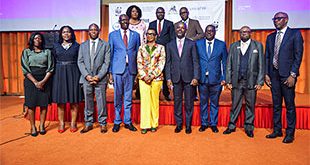
Kampala, Uganda | THE INDEPENDENT | Yara East Africa is at the forefront of transforming farming practices and enhancing food security in a rapidly changing world. In this exclusive interview, William Ng’eno, the Country Manager for Yara East Africa, shares insights into Yara East Africa’s ambitious vision for advancing the agricultural sector across Uganda and the broader East African region. With a deep commitment to innovation, sustainability, and community engagement
Ng’eno discusses the company’s latest initiatives, the challenges facing the agricultural sector, and how Yara is leveraging technology to empower farmers and foster a nature-positive future.
This conversation provides a comprehensive look at how Yara East Africa is driving meaningful change and what lies ahead for the region’s agriculture.
Can you elaborate on any specific initiatives or programs that Yara East Africa has implemented to promote sustainable farming practices?
Yara East Africa is deeply committed to promoting sustainable agriculture through a variety of initiatives and programs. Some of our key efforts include:
a. Yara Knowledge Centres: These hubs serve as practical demonstration sites where growers can learn and adopt sustainable farming practices. Through hands-on demonstrations and training sessions, farmers gain access to knowledge and tools necessary for sustainable agriculture.
Additionally, these centres provide a last-mile selling point for local farmers. For instance, the Yara Knowledge Centre at Asili Farm in Masindi has positively impacted over 1,000 farmers, equipping them with the skills and resources to enhance their farming practices sustainably.
b. Curriculum Development for Regenerative Agriculture Practices: Yara has developed comprehensive training manuals focused on regenerative agriculture practices. These materials are designed to train farmers in practical, sustainable farming techniques, ensuring that they can implement these practices effectively on their own farms.
c. Partnership Projects: Yara East Africa collaborates with key stakeholders in the agricultural sector, including coffee off-takers, to provide training, establish demonstration plots, and offer advisory services on the most suitable fertilizer options. Through these projects, numerous farmers have been able to significantly increase their yields while adhering to sustainable practices.
What are some of the major challenges facing the agricultural sector in East Africa today, and how is Yara East Africa addressing them?
The agricultural sector in East Africa faces several significant challenges:
Competence: There is a low level of adoption of Good Agricultural Practices (GAP) and new technologies among farmers and extension workers. This gap in knowledge and skills hinders productivity and the ability to implement modern, sustainable farming techniques.
Capacity: Both the infrastructural and financial capacities across the agricultural value chain are still quite limited, affecting both government and private sector initiatives. This lack of capacity constrains the ability to support and scale up agricultural activities effectively.
Last Mile Coverage/Aggregation: A significant portion of growers operates small, individual farms scattered across rural areas. These dispersed farming units often become uneconomical to serve due to the challenges of reaching and aggregating these farmers efficiently.
How is Yara contributing to solutions through its strategic ambition of Growing a Nature- Positive Food Future?
Yara is committed to driving a Nature-Positive Food Future by scaling up knowledge sharing and generating a positive global impact. Our approach is centered on the responsible production of food that is not only sustainable but also profitable for farmers. We achieve this through two key pillars:
Regenerative Farming: Our focus is on enhancing farming productivity and nutrient use efficiency (NUE). By adopting regenerative farming practices, we aim to positively influence nature across the value chain—improving soil health, increasing biodiversity, enhancing water and air quality, and mitigating land use change.
Prosperity: We are dedicated to improving farmer income and sustainability by fostering diversity among farmers and contributing to the global goals of zero hunger and healthy nutrition. This ensures that the prosperity we help create is both inclusive and sustainable,
benefiting communities and ecosystems alike.
These pillars are central to our strategy of fostering a food system that is both nature-positive and economically viable, ensuring a better future for all.
How do you plan to address the evolving needs of the agricultural sector in East Africa in the coming years?
As the agricultural sector in East Africa continues to evolve, Yara East Africa is committed to adapting and innovating to meet the unique and changing needs of growers. Our strategy includes the following key approaches:
Investment in Research and Development (R&D): We recognize the critical importance of R&D, particularly in the context of climate change. We will continue to invest in developing adaptive technologies that support farmers in navigating the challenges posed by a changing climate, ensuring they remain resilient and productive.
Strategic Partnerships: We believe in the power of collaboration and will prioritize partnerships with like-minded organizations to deliver comprehensive and beneficial solutions for growers.
By working together, we can pool resources, knowledge, and expertise to address the complex challenges facing the agricultural sector.
Soil Health Management: With a significant portion of our soils in East Africa being acidic and facing increasing pressure from land use, we will intensify our efforts toward soil health management. Our focus will be on promoting practices and products that enhance soil fertility, ensuring sustainable land use and the ability to produce more from less acreage.
Through these initiatives, Yara East Africa is committed to supporting the agricultural sector in the region, ensuring that it continues to thrive and meet the growing demands of food production in a sustainable and profitable manner.
Technology is transforming agriculture globally. How is Yara East Africa integrating technological advancements into its operations and offerings?
At Yara East Africa, technology is a cornerstone of our approach to enhancing agricultural productivity and sustainability. We leverage cutting-edge technological solutions to empower farmers, retailers, and distributors with the tools they need to thrive. Our integration of technology includes:
Knowledge Transmission: We utilize advanced digital platforms to disseminate Yara’s century- long agronomic expertise to farmers and channel partners. This enables them to access best practices and tailored advice, enhancing their productivity and sustainability.
Digital Platforms for Distribution: We have invested in digital platforms that allow farmers to easily locate and connect with their nearest retail outlets for Yara’s high-quality products. These platforms provide transparency in pricing and ensure that farmers can efficiently fulfill their orders, helping them to access the inputs they need when they need them.
Through these technological integrations, Yara East Africa is committed to driving the agricultural sector forward, ensuring that all stakeholders in the value chain are equipped with the knowledge and resources to succeed.
Can you discuss any specific technologies or digital tools that Yara East Africa is leveraging to support farmers?
Yara East Africa has implemented the Yara Connect digital platform, which is designed to enhance the efficiency and effectiveness of our distribution network. This platform allows our distributors and retailers to establish their online shops and better serve farmers across the region. Key features of Yara Connect include:
Loyalty Program: Retailers and distributors can accumulate and redeem loyalty points earned from the sale of Yara products, incentivizing continued partnership and engagement.
Order Management: The platform facilitates seamless ordering of products, ensuring that retailers and distributors can efficiently manage their stock and meet farmers’ needs.
Farmer Enrollment: Retailers and distributors can enroll farmer clients directly through the platform, allowing for more personalized service and better tracking of customer interactions.
Sales Reporting: Yara Connect provides detailed reports on sales evolution over time, enabling our partners to monitor their performance and make data-driven decisions.
To date, over 700 retailers in Uganda have enrolled on the Yara Connect platform, reflecting our commitment to leveraging technology to improve agricultural productivity and support farmers at the last mile.
Yara is a strong advocate for youth and women in agriculture. What advice would you give to young professionals aspiring to work in the agricultural sector and those already involved?
At Yara, we firmly believe that empowering youth and women is vital to the future of agriculture. One of our cornerstone initiatives in this mission is the Yara Influencer Program in Kenya, known locally as the Shujaaz Program. This program exemplifies our commitment, to working to uplift and enable young professionals and women within the agricultural value chain.
The Shujaaz Program focuses on identifying, training, and supporting young agricultural influencers who can lead by example and inspire their communities. Through this initiative, we’ve witnessed young individuals transforming into leaders, innovators, and advocates for sustainable farming practices. This program is not only strengthening agriculture in Kenya but also serves as a model we aim to replicate across East Africa, including Uganda. By providing training, mentorship, and access to resources, we are cultivating a network of empowered youth who drive positive change in the sector.
Our strategic ambition is to ensure that young professionals and women in agriculture have the tools, knowledge, and opportunities they need to thrive. We envision a future where agriculture is not only a source of livelihood but a prosperous and rewarding career, especially for the youth.
To young professionals looking to enter agriculture, I encourage you to embrace the sector’s opportunities, stay curious, and remain open to innovation. For those already working in agriculture, lead by example and advocate for sustainable practices that benefit both people and the planet. Yara is here to support you on this journey—together, we can create a thriving agricultural sector that serves as a foundation for economic and social development across East Africa.
 The Independent Uganda: You get the Truth we Pay the Price
The Independent Uganda: You get the Truth we Pay the Price


